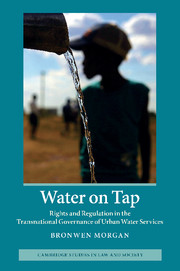Book contents
- Frontmatter
- Contents
- List of figures
- List of tables
- Acknowledgements
- Introduction: The field of global water policy: struggles over redistribution and recognition
- 1 Rights, regulation and disputing: a conflict-centred approach to transnational governance
- 2 Managed liberalisation and the dual face of French water services provision
- 3 ‘Another world is possible’: Bolivia and the emergence of a participatory public provision model for access to urban water services
- 4 Regulatory arbitrage and popcorn politics: contrasting disputing pathways in Argentina and Chile
- 5 Moonlight plumbers in comparative perspective: electoral v. constitutional politics of access to water in South Africa and New Zealand
- 6 Law's work: legality and identity in transnational spaces
- Epilogue
- References
- Index
- CAMBRIDGE STUDIES IN LAW AND SOCIETY
Introduction: The field of global water policy: struggles over redistribution and recognition
Published online by Cambridge University Press: 03 May 2011
- Frontmatter
- Contents
- List of figures
- List of tables
- Acknowledgements
- Introduction: The field of global water policy: struggles over redistribution and recognition
- 1 Rights, regulation and disputing: a conflict-centred approach to transnational governance
- 2 Managed liberalisation and the dual face of French water services provision
- 3 ‘Another world is possible’: Bolivia and the emergence of a participatory public provision model for access to urban water services
- 4 Regulatory arbitrage and popcorn politics: contrasting disputing pathways in Argentina and Chile
- 5 Moonlight plumbers in comparative perspective: electoral v. constitutional politics of access to water in South Africa and New Zealand
- 6 Law's work: legality and identity in transnational spaces
- Epilogue
- References
- Index
- CAMBRIDGE STUDIES IN LAW AND SOCIETY
Summary
This is a book about water: water as a basic good, an essential resource and a life need that is deeply embedded in relations of power, meaning and identity. But it is also a book about collective institution-building, about governing in a world of rapidly shifting power dynamics between governments, businesses and ‘ordinary’ people. From this second perspective, struggles over access to water are emblematic. They are an instance – a particularly intense instance – of conflicts over how to provide collective goods and services. The questions about provision and governance of water services explored in this book resonate with the provision and governance of other basic goods too – education, health, transport, communications, energy. These are all areas where the scope of state-led capitalism is especially contested, and many of them also echo the question that water raises most intensely: how far should economic principles of market-based delivery govern the provision of collective goods? What is the fate of ‘the social’ as state–market relations are ever more intensively reconfigured? Where, if not with respect to water, can we find, define and make real the limits of a market-based political economy?
These substantive political questions are deeply linked to the reconfiguration of state–market relations in a context of global governance, where the role of the nation-state in collective provision of essential services is increasingly supplemented and re-shaped by transnational institutions.
- Type
- Chapter
- Information
- Water on TapRights and Regulation in the Transnational Governance of Urban Water Services, pp. 1 - 21Publisher: Cambridge University PressPrint publication year: 2011

